The Sam Diego Chargers drafted Sam Gruneisen out of Villanova. He was part of the fantastic draft class that also brought in Lance Alworth, John Hadl, Frank Buncom, and others. Gruneisen began his career as a back-up guard, but moved to center when Don Rogers left the team in 1965. From ’65-1972, the Chargers had solid offensive leadership with John Hadl at quarterback and Sam Gruneisen at center. I was able to speak with Sam Gruneisen in 2003, while researching for my book, Charging through the AFL. Here is our conversation…
AFL – Tell me about how you came to the Chargers.
SG – Al Davis was our receiver coach at the time and he was the one who scouted me. Al Davis and Al LoCasale ended up scouting me and signing me.
AFL – Were you concerned that the AFL might not succeed?
SG – No, that was the only chance I had. I wasn’t going to be an NFL player, didn’t seem like. This was back… They signed me in ’62, so that was only the second year of the AFL. There didn’t seem to be any other opportunity and I was just happy that the AFL was there and was looking forward to playing, because the Chargers were the only ones that approached me at all.AFL – The Chargers coaching staff had three future Hall of Fame coaches in Sid Gillman, Al Davis and Chuck Noll. Did it appear to be a knowledgeable or overly impressive staff at the time?
AFL – The Chargers coaching staff had three future Hall of Fame coaches in Sid Gillman, Al Davis and Chuck Noll. Did it appear to be a knowledgeable or overly impressive staff at the time?
SG – Well, I didn’t have any experience, but I could tell that Sid was always a tremendous coach. And of course, my coach, the o-line coach, they were just so knowledgeable. Over and above anything I had in college, as far as knowledge. Chuck Noll, you could tell was a good coach, but I didn’t play defense. I just played guard and center. All of them obviously were good and they had great personalities. Probably Joe Madro never got the respect that he deserved. He was just tremendous. He took us as a group of no-names and made us play pretty well.
AFL – What benefits do you think, not monetarily, you got playing with the Chargers that you may not have gotten from playing with any other team in the AFL?
SG – I don’t know. Maybe I wouldn’t have had a job at all, that’s one thing. The Chargers respected that I was knowledgeable and I learned quickly, learned easily, and had a little bit of leadership qualities and they used those. You know what I’m saying? Even though at the time I may not have even understood that. I definitely appreciated the fact that they did and gave me the opportunity to grow. I don’t know what kind of player I was. I know that I was fairly smart and fairly quick and we won a lot of ballgames and I was just happy to be part of it.
AFL – Well you must have been pretty good to play as long as you did.
SG – Well, I had good longevity. I didn’t get injured frequently and I had a high pain threshold. And I played, played fairly decent, and I kept our group of linemen together. On the field you share the passion, but you also share what you don’t know. You are not afraid to ask each other and help each other to know exactly what to do in a given situation. So all of that communication, it’s always present. Or it needs to be present so that you can depend on your buddies.
AFL – Tell me about Sid Gillman.
SG – Well, as I look back now, Sid was our father image, our grandfather image. We all had, I guess the personal side with him as general manager and you didn’t want to face that. I hope he treated us as fairly as he could, from a monetary point of view. But as a coach he was still a father figure and loved us and that’s how he treated us. We knew that we were cared for and about, and that’s why we busted our butts for him. He very much was a father image to almost all of the guys, and our families too. He and Esther, they were really a family image for us. Because we were all young, all just married, most of us just married and starting to have our own families. They helped us through a lot of things. They were the ones we called.
AFL – You played different positions on the offensive line. Was it difficult to go from the center to guard position? Which position did you prefer?
SG – No, I really didn’t find it that difficult to switch. I was just in-tuned with what we were trying to do as a team or as an offense, and understood what each guy had to do, and why. So it was a matter of just clicking into the position that you were playing that day or that minute. We always shifted around in practice and you learned how to focus and do what you’re supposed to do. I didn’t find one more enjoyable or less enjoyable. I did enjoy playing center. There was a lot of responsibility with that and I felt that I accepted that and took it and ran with it. I did enjoy that point of view. Probably if I didn’t play center I probably couldn’t have played as long. At times it wasn’t as physically difficult as others. But you’re out there in the middle of it, so you might as well make the most of it.
AFL – Tell me what you remember about the 1963 championship game. What role did you have, if any?
SG – I really didn’t. I had been injured. With about four games to go I dislocated my left elbow and I was a spectator. You’re talking about the one where Keith Lincoln went wild? No, I actually was just a team member, but I wasn’t active or dressed for that game.
AFL – What made the 1963 team better than the ’64 or ’65 teams that also made it to the championship games?
SG – Well, I’m sure you’ve heard all the Rough Acres stories.
AFL – I’ve heard a handful.
SG – That’s where we started. They had our training camp out there and Sid made the deal with us that if we won the preseason games, that he allowed us to stay home an extra day. If my mind is right, we won all our preseason games and I think we won our first 12 games in a row, until we lost. But the Rough Acres was a coming together. I really believe this. We got to know each other better. Tobin Rote was very, very key in all of that. Sid trusted him explicitly and he was the type of personality that he surrounded us, as opposed to us surrounding him. He was a character, but a very honest person and he made demands on us because of his experience. I think Tobin at that time was about 37 years old and had been through the wars. I mean he made demands on Keith and Paul Lowe and Lance and our receivers that they had to do what they were supposed to do. And I think we grew up a lot that year. I think the Rough Acres experience itself had a lot to do with that because we were forced to be together, whether we liked it or not, and he was the inspiration to keep us together and keep it fun. Even though it was probably miserable. I don’t remember it being so miserable, it’s a long time ago. But at the time it was just a unique situation and Tobin was the key to the chemistry. Hell, we just banded together and did what we were supposed to do. I think that was a huge key or a huge factor. As far as the other championship games, we always ended up playing Buffalo and Buffalo apparently was better than us. We beat them sometimes during the season, but in the playoff games, they seemed to beat us. It was tough. It was tough to deal with, tough to live with, but 40 years later you can look at it and say, “I guess they were better.”
AFL – Do you remember any funny or amusing stories about Rough Acres?
SG – Oh no, other than the rats and the rattlesnakes. There was one bar. It was about 10 miles away and we tore up and down that dirt road every night going there. Paul Maguire was the leader of that. But that’s what it was. If you went to have a beer, you all went to the same place. So that was good too.
AFL – It was the ’64 championship game when Keith took that really vicious hit from Mike Stratton. Do you think that changed the course of the game?
SG – Absolutely. It changed the course of Keith’s football career. I mean, he laid his chest wide open. You could put your hand in where it cracked his breastbone. We only had like 34 players. It wasn’t like we had 45 or 50 guys. Obviously he was key and you just had enough guys to play a game. I don’t know if you could play a game nowadays with only 33 or 34 guys and be very effective. John (Hadl) was our punter and George Blair was our place kicker. You had starters that had to do everything. It limited what you could do on offense and defense. Expanding the team, like our team here at school (Gardner Webb University), we’re a four-wide team. We have a tight end, but we have one. You know what I’m saying? You don’t use them that much. In those days you had just the regular complement of people. You had two wide receivers, a tight end and two backs. We would probably carry about 16, 17 guys on offense and only 14 or 15 on defense. It really limited what you could do. That’s how the game has changed. Is it better? I don’t know, but it sure has enabled many more players to play, obviously. But I would say that when Keith got hurt in that game, it was probably the momentum-getter for them. A hit like that, your team just thrives on that. The team that got the hit, I mean obviously, we were concerned for Keith and what we were going to be able to do. I don’t remember it like it was yesterday, but I do know that it was a vicious hit and he didn’t deserve it. But that’s what he got.
AFL – Why do you think the Chargers did not return to the championship game after 1965?
SG – Well, Kansas City was getting better. Denver was getting better. The Raiders seemed to stay the same. They were always seeming like they were good. Miami was better, got better as time progressed. I’m trying to think… The expansion was about that time, ’66.
AFL – Right. Miami came in 1966.
SG – Cincinnati. I would guess that the biggest reason was our own conference. That Kansas City and Denver got better. Kansas City was Dallas when I first started playing and when did Pittsburgh come into the league.
AFL – That would have been after the merger, so in 1970.
SG – I guess the biggest reason was expansion and that Houston was good all the time. You had your hands full when you played Houston whether it was home or away. Kansas City just got better. I don’t know if their scouting department was better or whatever the reason. I know Hank Stram was a helluva coach and the guys really responded. They had a nucleus of players like Bobby Bell and E.J. Holub and Buck (Buchanan). By then I think even Ernie Ladd was playing for them in ’66 or ’67. They got better and maybe we didn’t. I don’t know. I don’t think I have ever really thought about it. But it kind of goes in cycles. Kansas City went through a time. The first Super Bowls were about that time. Wasn’t the first one in ’67 or ’66?
AFL – I think it was after the ’66 season. But Oakland was in the first two and then Kansas City was in, what, the next two? Well, the Jets were in there too, for that one year. I don’t know. Like I said, I think the biggest thing was in our own conference. Kansas City just got better.
AFL – The later years of the AFL were tumultuous for Gillman because of his relationship with Gene Klein. Could the players see any of this or was it well hidden?
SG – We just knew it existed. I don’t know that we were ever honored with being able to sit in on any meetings that we knew what Gene’s goals were. You know what I’m saying? He was a businessman, and obviously was a very good one. You just don’t know where the owners’ minds are as far as goals. He may want to win a championship, but did he spend the money to be a championship team? I don’t know that one way or the other. But I know you have to be committed from top to bottom or it doesn’t happen. Somebody’s gotta be in charge. You can’t have two people in charge. I don’t remember what the situation was exactly, but I’m sure there was the remembrance of the conflict between Gene and Sid. You know, I’m sure it was over nothing. But all those little nothings end up being big things when it all blows up. I’m sure it was a little power struggle or whatever it was. It obviously didn’t work out after that.
AFL – Which of your teammates impressed you the most as athletes?
SG – Oh, I think I was always impressed with Paul Lowe’s ability to run with the football and Keith Lincoln’s ability to run between the tackles with the football. Obviously Lance was just a terrific athlete, one of the first truly great ones who was always was one of the first one’s on the field and the last ones to leave. Always trying to improve. But our defensive guys were equally important. I think that Emil Karas and Chuck Allen were great influences on everybody as far as working as hard as you can and getting the most out of their bodies. Probably a kid that is never mentioned, Kenny Graham. I think Kenny Graham went to Washington State and played safety. What a competitor. There was just a number of players who were just the leaders. It wasn’t so much their athletic ability, Lance stands out with that. But it was that the guys would work that hard in practice and make it happen in a game. John, John, what a competitor John Hadl was. A good athlete, not the greatest quarterback per say, but his knowledge of the game and his ability to lead. His character, that’s what a team’s all about. We had a team of good characters who played hard for and with each other. I think that’s what made us very successful. And I know I’m leaving a lot of guys out. Steve DeLong, Dick Harris. Dick Harris may still own the AFL record for number of interceptions in a season, I don’t know. But I know Dick played a helluva football game. Walt Sweeney and Ron Mix, Ernie Wright. You can go on and on and name them all. After a couple of years they were special people because you lined up with them and guarded each other’s backs. You trusted them. And I think that’s the most remembered thing in my mind. You played the same guys all the time. I know a lot of the Raiders, I know a lot of the Chiefs and all that kind of thing. And you look forward to playing because you know you can count on each other. It wasn’t maybe so much winning the game, although at the time it was. But it’s just guys that you learned to trust and love and you went out and played. So it was an exciting, exciting time. It was an exciting time in my life. I know I still awake some nights thinking about certain things that happened. But we had some good athletes and great competitors.
AFL – What is your favorite road trip memory?
SG – I can’t. I’d get in trouble with my wife. There were many. Not all of them are good. I’ll dodge that question.
AFL – What did you dislike about being a professional football player?
SG – I don’t know that there’s anything to dislike about it. In my own mind I never thought about it like that. I thought it was exciting to go on the road and play. We used to go on and play Buffalo, Boston and the Jets or Titans all in the same series, where you were gone for two weeks or a little bit more. I always thought that was exciting. That’s how you did it, that was part of it. After I got older and had my own children, I guess going away to training camp was hard to do, but that was expected too. I don’t know if I ever thought of anything as a true dislike. Hated to see friends get cut, guys you’d played with. I don’t know if there is anything to dislike. I hated when people got hurt. As we’ve gotten older, a few guys have died off. It seems unnecessary. But I’m sure that we put our bodies through so many wrecks that… You can see a broken arm, you just don’t know what you did to your internal organs and stuff like that. It’s hard now and seeing young people, at my age I still think we’re young. People who died because we beat our bodies up so bad, that’s probably the worst part. But I’d do it again tomorrow and so would they. I don’t think that there’s anybody that wouldn’t do it.
AFL – Unfortunately there have been a fair number of your teammates that have passed away so far.
SG – Yes, you see it everyday in the papers. Somebody from one of the teams.
AFL – Charlie Tolar most recently.
SG – We just had a friend from Cleveland, Nick Roman. Nick was 56 years old. He’s seven years younger than me, and you know what I’m saying. But we know our bodies are going through Hell right now. We’re paying for it, but I think we’d all do it again. I think so. It’s just the athlete’s mentality, you would do it again. We weren’t immortal. Thought you were, but the first time I had a kidney stone I realized I wasn’t.
AFL – Looking back now, what are your fondest memories of the Chargers?
SG – I would just think the family atmosphere. It’s something that I’ve always cherished. The camaraderie and the camaraderie of the families. We were a young, new league, so everybody was basically the same age and all having families at the same time. There’s a life-long of football memories and a lifetime of family members. We shared each other’s births and as I look back on it, that was just a tremendous time in our lives. I’m not sure if you’re in the military or whatever at that same age group that you’d be doing the same thing, but a lot of it has to do with the age group and that we were just out of college and starting our own lives and own families. There was so much compliment to each other. There very little negative. I just see that as one of the real positive influences in my life and in my children’s lives. That they got to experience that at their young age. We talk about it constantly. My boys are 39 and 38 and my daughter is 33, and that’s what they talk about. That was their life. The Chargers were their life, their memories. I just think from a family point of view it was crucial and vital.
AFL – …I just spoke with Bill Hudson yesterday.
SG – … Good guy. I mean he was a couple of years older than me. He and Hank Schmidt, and they just played their butts off. You know what I’m saying? It was their last chance, I guess, to play football and… Has the name Frank Buncom come up?
AFL – Several times.
SG – Frank, obviously died and Reg Carolan died. They were both guys that were rookies together with us, that were tremendous football players, and tremendous competitors. They complimented what we did. They were good guys. Have you talked to John Hadl?
TT – Yes, John and Lance and… and Earl Faison.
AFL – All the ones you mentioned. You talk about Earl Faison. Earl Faison was… He was one of the special people. He was such a great football player. Obviously we were lucky to have him at the Chargers in those days when the NFL and AFL tried to get him and sign him. What a great, great football player and a great person. He’s outstanding. You ask about memories. The guys were good guys. They were good characters. There were always a few characters, but they were good, moral people who did a good job. You could count on them. That’s just what I remember. You just could count on each other.

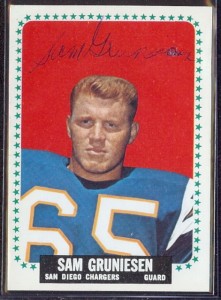
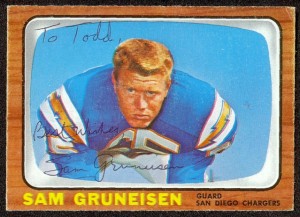
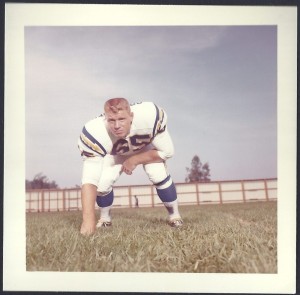
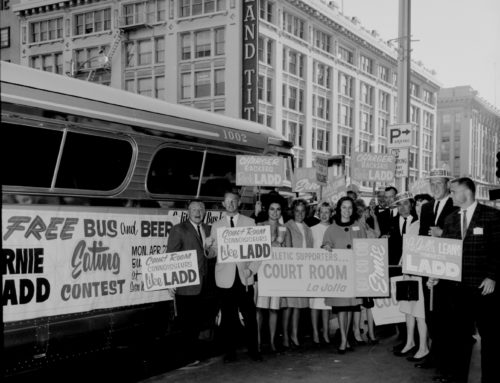
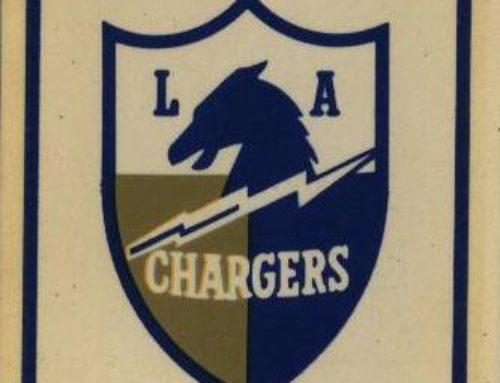
In doing research on a possible book about the late Frank Buncom, I came across a letter that Buncom’s wife Sarah kept after his death. The letter, written in 1969, is from the mother of a young Chargers’ fan who had cerebral palsy. The mother writes that Sam Gruneisen and Buncom (along with another former Chargers player, Jim Tolbert), would spend time with her son during the 1967 season, visiting with the youngster and encouraging him during his illness.
This speaks highly of Sam and documents his “good guy” persona.
Thanks for sharing additional memories, Todd. Those early Chargers teams were full of great personalities.
Great stuff, Buzz. Thanks for sharing it!
[…] San Diego Chargers offensive lineman, Sam Gruneisen, passed away on Friday, September 28th. He died due to complications from a fall that he took a […]
Todd; A great article on Sam.
My wife and I originally met Sam and his beautiful wife Barbara when the “LA” Chargers moved to San Diego after their initial season in Los Angeles. Sam and Barb bought thier first home across the street from us making friends with all of us immediately. Sam was an immediate “Star” with the neighborhood kids as he would always be available to go out and play various games with them. Based on Sam’s size, the kids would all take turns and hide behind Sam during “hide and seek”, etc. One of the older kids went to Sam’s house and rang the door bell and ran and hid. After 2 or 3 times of Sam not finding anyone around stood by the door and waited for this to happen again and when it did, Sam was out the door in a flash and caught the prankster startling the younster who froze in his tracks not believing Sam could move that fast. During training season, Sam would have Paul Lowe and Earl Faison over to his house for a “mini” workout where they would take a golf club and numerous golf balls up behing Sam’s house. This hill overlooked a large canyon and they would see who could drive the balls the furtherst across this canyon. When they exhausted the quantity of balls, they would then run down Sam’s hill across the canyon floor and up the opposite canyon wall retrieving the golf balls then run all the way back to the top of Sam’s hill and do the same thing again, and again and again until it got too dark. Another time , Sam had Paul and Earl over on a weekend of no practice and they would all work out with heavy weights in Sam’s garage. One time during these sessions, they loaded the lift bar with an vast amount of weight for Earl Faison to lift while they spotted the bar for Earl. He managed to dead lift this bar just past his chest, lost his grip and balance with the weighted bar crashing to the garage floor. This left a crack from one side of Sam’s garage new concrete floor to the other. We felt the impact clear across the street. To this day I don’t think Sam ever told Barbara. Times were sure interesting to say the least. My wife Jeanie, Son Scott and I will always remember Sam and his beautiful family.
[Todd; if there is any chance to obtain Barbars’s address (residence or Email) as we lost contact with them when they moved to Oakland, can you or someone you know send us the info so that we may contact Barbars?]
… [Trackback]
[…] Read More Information here to that Topic: talesfromtheamericanfootballleague.com/sam-gruneisen-of-the-san-diego-chargers/ […]
… [Trackback]
[…] Find More Information here on that Topic: talesfromtheamericanfootballleague.com/sam-gruneisen-of-the-san-diego-chargers/ […]
… [Trackback]
[…] There you will find 34466 additional Info to that Topic: talesfromtheamericanfootballleague.com/sam-gruneisen-of-the-san-diego-chargers/ […]
… [Trackback]
[…] Information to that Topic: talesfromtheamericanfootballleague.com/sam-gruneisen-of-the-san-diego-chargers/ […]
… [Trackback]
[…] Find More on to that Topic: talesfromtheamericanfootballleague.com/sam-gruneisen-of-the-san-diego-chargers/ […]
… [Trackback]
[…] Information to that Topic: talesfromtheamericanfootballleague.com/sam-gruneisen-of-the-san-diego-chargers/ […]
… [Trackback]
[…] Information on that Topic: talesfromtheamericanfootballleague.com/sam-gruneisen-of-the-san-diego-chargers/ […]
… [Trackback]
[…] Read More on to that Topic: talesfromtheamericanfootballleague.com/sam-gruneisen-of-the-san-diego-chargers/ […]
… [Trackback]
[…] Information on that Topic: talesfromtheamericanfootballleague.com/sam-gruneisen-of-the-san-diego-chargers/ […]
… [Trackback]
[…] Here you will find 23925 additional Information to that Topic: talesfromtheamericanfootballleague.com/sam-gruneisen-of-the-san-diego-chargers/ […]
… [Trackback]
[…] Find More Info here to that Topic: talesfromtheamericanfootballleague.com/sam-gruneisen-of-the-san-diego-chargers/ […]
… [Trackback]
[…] Find More Information here to that Topic: talesfromtheamericanfootballleague.com/sam-gruneisen-of-the-san-diego-chargers/ […]
… [Trackback]
[…] Find More Info here on that Topic: talesfromtheamericanfootballleague.com/sam-gruneisen-of-the-san-diego-chargers/ […]
… [Trackback]
[…] Find More Information here to that Topic: talesfromtheamericanfootballleague.com/sam-gruneisen-of-the-san-diego-chargers/ […]
… [Trackback]
[…] Info to that Topic: talesfromtheamericanfootballleague.com/sam-gruneisen-of-the-san-diego-chargers/ […]
… [Trackback]
[…] Here you can find 89231 more Info on that Topic: talesfromtheamericanfootballleague.com/sam-gruneisen-of-the-san-diego-chargers/ […]
… [Trackback]
[…] Find More Info here to that Topic: talesfromtheamericanfootballleague.com/sam-gruneisen-of-the-san-diego-chargers/ […]
… [Trackback]
[…] Find More Information here on that Topic: talesfromtheamericanfootballleague.com/sam-gruneisen-of-the-san-diego-chargers/ […]